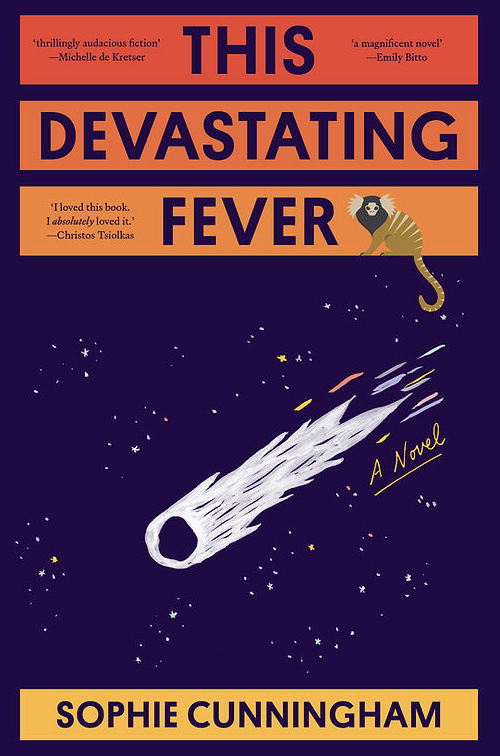This Devastating Fever by Sophie Cunningham
This Devastating Fever (2022) took Australian author Sophie Cunningham 16 years to write. Dipping in and out of time in a fashion resembling its own conception, this original novel explores the life of Alice, a struggling author living through bushfires, pandemic lockdowns, and an ongoing climate crisis, painted against the backdrop of the previous century and the thinkers and writers that defined it – most notably, Leonard and Virginia Woolf. This Devastating Fever explores what it’s like to live through a time that feels like the end of days, followed by the realisation that those moments have happened before and will happen again.
In Alice’s timeline, like Cunningham herself, the protagonist is struggling to finish her novel. Amidst bushfires, floods, COVID-19 lockdowns and the ever-present pressures of climate change, Alice finds it difficult to shape her book to her agent’s liking. In it, she wishes to explore the life of Leonard Woolf, during his time in then Ceylon as a diplomat, his meeting Virginia, all the way to her suicide. Throughout Alice’s research across years and continents, she is often visited by the ghosts of Virginia and Leonard, who shine a light on sections of her writing. In her own personal life, a range of secondary characters come and go – her wife, Edith, her parental figure Hen, as she struggles with early onset dementia, as well as her agent, absent father and siblings.
Leonard’s timeline, on the other hand, offers a well-researched insight to the lives of the Bloomsbury Set – a group of academics, intellectuals, philosophers, critics, and artists who came to heavily influence modern attitudes towards feminism, pacifism and sexuality, among other things, spearheaded by the Woolfs themselves. Backed up by quotes from letters, diaries and Cunningham’s occasional explanations in the form of footnotes, the reader is transported back and forth in time, to see what roles art and fiction can play in the face of certain devastation – whether that’s COVID-19, climate change, World War I or the Spanish flu.
This Devastating Fever takes on a lot, and it succeeds in making a coherent whole out of largely unrelated themes: mental health, caring for others, climate devastation, sexual freedom, colonialism, the role of history. Even love – or its absence.
‘Love is just a word people say to each other. They open their mouths. Food goes in. Words come out. Love…’”
Its narrative is a multi-layered, meta self-referential feast – exploring all of the above, and even more specifically the state of the publishing industry in Australia today. From the decreasing profitability of the industry, and the increasingly murky line between fiction and non-fiction, Cunningham’s criticism is subtle yet self-aware.
“Then the two women burst out laughing. As if the publishing industry was a war they’d survived together rather than what it was: a pile of words about stuff that went in and out of fashion, that was largely ignored, but every so often changed people’s lives.”
This Devastating Fever hits the mark – but only partially. Despite obvious parallels between the two worlds, Cunningham fails to truly deliver on Alice’s side of the story. Given that this is the story that’s new to the reader, it’s a shame we don’t get to spend more time with the protagonist just being herself. She is often accompanied by the ghost of either Virginia or Leonard, and while these instances facilitate two-way communication between the past and the present, they are largely focussed on Alice’s pursuit of her book, omitting her own life that exists outside of her relation to the Woolfs.
Her absent father, librarian wife, her relationship with the woman who raised her and her siblings – these are all trumped in comparison to Cunningham’s exploration of the Bloomsbury Set. These characters show much promise, but are rather underdeveloped, which is especially frustrating as all the meat is there: the similarities between Leonard caring for Virginia and Alice caring for Hen, the complexities of relationships, whether that’s between siblings or romantic interests, or the effects of looming doomsday.
Even Alice’s own experiences with sexual assault are tacked on haphazardly instead of explored with nuance. While Alice’s (or rather, Cunningham’s) reflections are sharp and poignant, they are unfortunately far and few between.
“Certainly sisters could be raped. All manner of men, related or not, could hug too hard, too long, pull you onto a knee, climb into your bed, tell you that you were beautiful, as if that were a compliment.”
As a result, while This Devastating Fever sets out promising to draw nuanced comparisons between the start of the 20th and the 21st century and their reiterations of life, art, sex, love, writing, and disruptive world events, it is eventually lost to its own ambitions, losing sight of the very similarities it’s attempting to draw. It is wholly original though, and has many laugh-out-loud moments as well as some thoroughly thought-provoking parts. Despite its shortcomings, This Devastating Fever is unlike any other book you’ll read this year.
Fruzsina Gál is an aspiring writer, born in Hungary but living in Australia. She has been a reader all her life, and her first short story, 'The Turul' was published in Griffith University's 2018 anthology, Talent Implied. Her writing is often focussed on identity and the effects of immigration on the self. You can find her online at www.fruzsinagal.com or @thenovelconversation.
